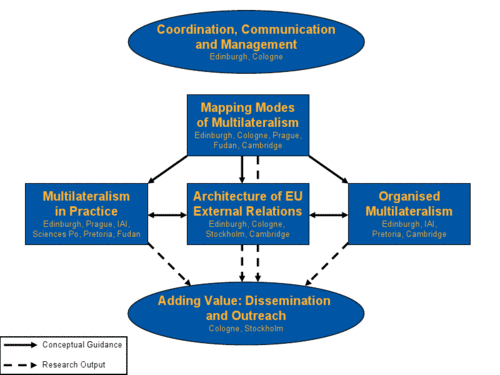 |
|
The research carried out in the framework of MERCURY focuses on the following central question: does the European Union deliver on its commitment to effective multilateralism? To answer this question, the work of the consortium has been structured on the basis of four research and two horizontal work packages (see also the graph). First, a theoretical work package (“Mapping Modes of Multilateralism”) will establish a historically-based understanding of approaches to multilateralism. Second, building upon the insights generated within the theoretical work package, three empirical work packages will systematically analyse key aspects of EU multilateralism. These key aspects are (a) EU institutional and policy dynamics (“Architecture of EU External Relations”), (b) interactions with external regions and strategic partners (“Multilateralism in Practice”) and (c) the EU’s performance in a multilateral context, focusing both on major international organisations and informal groups of which it is part (“Organised Multilateralism”). The two horizontal work packages are responsible for the management of the project and the dissemination of research results, respectively. The MERCURY consortium is composed of the following nine institutional partners: 1. University of Edinburgh, United Kingdom (MERCURY co-ordinator) 2. University of Cologne, Germany 3. Charles University in Prague, Czech Republic 4. Instituto Affari Internazionali (IAI), Rome, Italy 5. Fondation Nationale des Sciences Politiques, Paris, France 6. University of Pretoria, South Africa 7. Fudan University, Shanghai, China 8. Stockholm International Peace Research Institute, Sweden 9. University of Cambridge, United Kingdom
|
